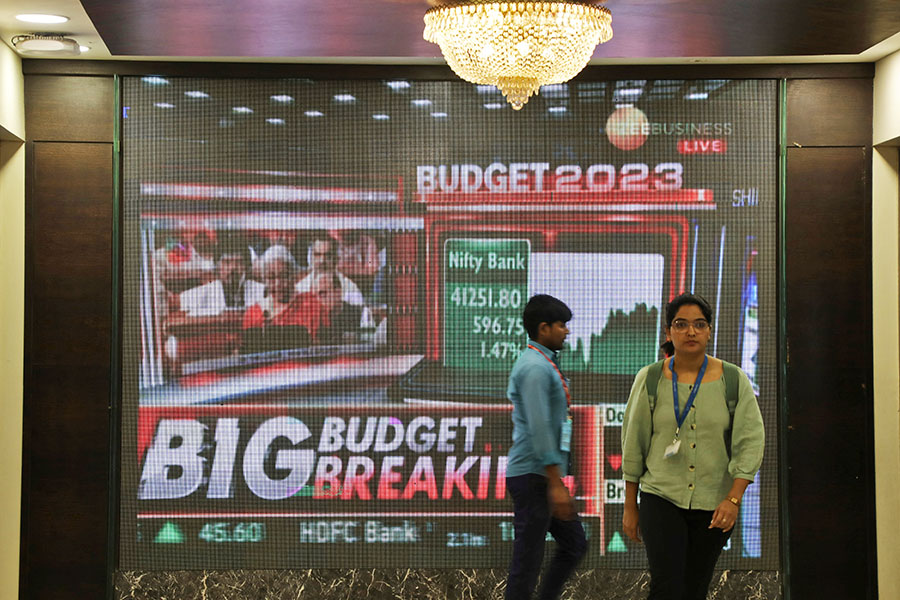
What punctured markets' euphoria on Budget day?
The government's emphasis on consumption, infra and capex push boosted sentiment but sell-off in insurance stocks due to the new tax regime blew off the gains
 The BSE Sensex eventually ended at 59,708.08, up 158.18 points or 0.27 percent.
Image: Shutterstock
The BSE Sensex eventually ended at 59,708.08, up 158.18 points or 0.27 percent.
Image: Shutterstock
Even as the equity markets seemed enthusiastic about the government’s Budget measures to boost growth by pushing investments, the euphoria was shortlived. A 1,223-point rally on the Sensex during the Budget speech by Finance Minister Nirmala Sitharaman turned into a drastic fall as investors sieved through details of the announcements. An overtly optimistic Budget math triggered jitteriness among investors.
What added to the anxiety and nervousness is the massive selling rout in Adani group stocks, some of which are index heavyweights.
Nomura economists feel the Budget numbers were overly optimistic. “On the margin, we think yes. We expect growth to slow materially in FY24, owing to a mix of developed markets recessions and the lagged impact of tighter monetary policy, with real GDP growth at 5.1 percent year-on-year in FY24 and nominal GDP growth at around 8.5-9 percent. The resulting lower nominal GDP growth means tax revenues are likely to disappoint. In addition, we foresee political pressure for countercyclical spending, especially given that the current plans suggest revenue expenditure growth of only 1.2 percent in FY24,” say Sonal Varma and Aurodeep Nandi, economists, Nomura. They feel the government can still meet its 5.9 percent deficit target, but will have to cut back on its projected capex target.
“This is possible, but if growth slows, as we expect, then policymakers may prioritise growth over fiscal consolidation, which is a risk in the second half of FY24. For now, the government has projected a growth-oriented budget without rocking the macro boat,” they add. The government expects nominal GDP growth of 10.5 percent year-on-year in FY24, down from 15.4 percent in FY23. It has significantly raised the capex outlay to Rs 10 lakh crore, including a continued extension of Rs 1.3 lakh crore of interest-free loans to states for capex.
Also read: Budget 2023: Create jobs, spur demand, win votes
Analysts said the government’s emphasis on consumption, infra and capex push, fiscal consolidation boosted markets sentiment but sell-off in insurance stocks due to negative impact of the new tax regime punctured the markets rally. With the Budget out of the way, investors also seemed worried about the outcome of the Federal Open Market Committee (FOMC) meeting. The US Federal Reserve is anticipated to increase key interest rates after the two-day meeting concludes tonight.
Cyril Charly, analyst, Geojit Financial Services, says, “Life insurance stocks saw significant selling on demand concerns as the budget proposals made life insurance schemes less appealing as a tax-saving instrument. The Union Budget has provided a higher impetus for individuals to shift to the new tax regime, which does not favour exemptions from investments in insurance schemes. Adding concerns to the growth outlook, it was also proposed to tax the income earned from life insurance products (other than ULIPS) issued after April 1, 2023, where the total annual premium exceeds Rs 5 lakh. This has taken away the tax-free advantage of high-value traditional insurance policies, making them less attractive for investments. These proposals have come as a big blow to the sector, which had hoped for positive measures from the government to improve its penetration. This has caused investors to reconsider the sector's growth prospects, forcing them to stay side-lined.”
Also read: A pro-growth, surprise-free budget
Overall, analysts believe the Budget focus on capex-led growth will improve the quality of government spending, and provide a credible fiscal consolidation path.
“The sharp increase in capital spending in a year of global uncertainty, credible fiscal consolidation, no change in capital gains tax regime for equities, lower-than-expected market borrowings, and a likely shift in the RBI stance augur well for stocks. This Budget probably means the consensus may need to raise earnings estimates—we remain 10 percent ahead of the consensus EPS (earnings per share) on the BSE Sensex,” analysts at Morgan Stanley say.
“The Budget is pro-growth with focus both on investment (capital outlay increase) and consumption (direct tax cuts). This will be an important driver of broad-based GDP growth in FY24, critical to maintain the fiscal roadmap outlined by the government. Meanwhile, capital gains (on equity) remain unchanged, which addresses one of the concerns pre-budget. Tax changes on some savings products in insurance is a negative for the insurance sector,” says Rahul Singh, CIO-Equities, Tata Mutual Fund.
The government met its FY23 fiscal deficit target (of 6.4 percent of GDP), as expected, as higher tax revenues and nominal GDP growth offset the surge in subsidy and other spending. For FY24, it set a fiscal deficit target of 5.9 percent of GDP. The government confirmed there would be no extra net market loans in FY23, despite the increased size of the fiscal deficit in absolute terms. The slippage will be funded by an extra Rs 50,000 crore of T-bill (treasury bill) issuance. For FY24, it pegged its gross market borrowing at Rs 15.43 lakh crore.
"On the flip side, no recapitalisation of the weak PSU general insurance companies was a surprise. The improved attractiveness of the new tax regime will reduce the demand for tax-break induced investment products,” says Karthik Srinivasan, senior vice president, group head, financial sector ratings, ICRA.
Post Your Comment

















